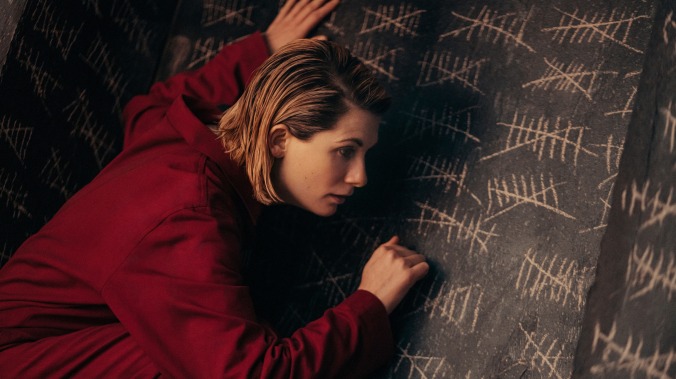A disappointing Doctor Who special highlights the weaknesses of the show’s current era


“Two hearts. One happy, one sad.” I know just how you feel Doctor. For the first Doctor Who episode of 2021, writer/showrunner Chris Chibnall delivers a special that highlights the frustrating flaws that have limited the sky-high potential of his era of the series. “Revolution Of The Daleks” is chockfull of interesting ideas, relevant themes, and fascinating character beats. But Chibnall delivers those components in baffling proportions, placing most of his focus on a boring, formulaic Dalek plot, and leaving little room for satisfying sci-fi surprises or moving emotional beats. As a New Year’s special, “Revolution Of The Daleks” is a disappointment. And as a farewell to Ryan and Graham, it’s a bizarrely unfocused affair—one that’s just about saved by some lovely work from Tosin Cole, Bradley Walsh, and the rest of the cast.
Despite a massive season finale cliffhanger that saw the Doctor stranded from her companions in a Judoon prison, “Revolution Of The Daleks” is first and foremost interested in serving as a direct sequel to the 2019 New Year’s Day special “Resolution.” It opens with an extended and entirely unnecessary prologue detailing how the empty Recon Dalek casing from that previous special wound up falling into nefarious hands in this one. And though the opening truck heist is only a few minutes long, it throws off the balance of the whole episode, priming us to focus on two government agents who have absolutely no barring on the rest of the story.
It’s a microcosm for Chibnall’s focus problems. He’s obsessed with answering questions the audience isn’t invested in, while leaving elements that actually do matter under-explored. Instead of reintroducing or recontextualizing returning American businessman baddie Jack Robertson (Chris Noth, who we haven’t seen since 2018’s “Arachnids In The UK”), Chibnall is hyper-focused on logistics about where and how this episode’s various Dalek variations were created. And that means underdeveloped tech-whiz-turned-Dalek hostage Leo Rugazzi (Nathan Stewart-Jarrett) gets far more screentime than poor Bradley Walsh does in his own farewell episode.
It’s a frustrating turn for an episode that starts out as an eerily relevant parable about how easily governments can slip into fascism in the name of “security.” Though this episode was shot back in 2019 alongside the rest of season 12, it’s remarkable just how much it feels like a commentary on 2020’s reckoning with police militarization. Robertson and Leo team up with soon-to-be Prime Minister Jo Patterson (Harriet Walter) to create an army of AI-controlled Dalek defense drones that can be used to patrol streets, manage borders, and quell civilian unrest—an idea that’s terrifying even before it backfires on them when cloned Recon Daleks take over the tech. Yet the pointed political commentary winds up getting lost in the shuffle as Jo and Leo are unceremoniously killed off, and a far more conventional “Daleks want to conquer the Earth” story takes center stage instead. The idea of different Dalek mutations murdering each other over their obsession with “purity” is relevant in a different way, but feels tacked on to the earlier Dalek defense drone storyline.
That same sense of wasted potential exists for our heroes as well. There’s a burst of creativity to the montage of the Doctor’s life inside the Judoon prison (where I believe it’s suggested she’s been imprisoned for at least 19 years). But instead of living in the tension of what happens when the Doctor is separated from her fam, Chibnall is in a rush to get the TARDIS team back to its standard configuration—so much so that he literally has Captain Jack show up with a “get out of jail free” ball. Soon enough, it’s back to the sort of sedate stand-and-talk conversations that have defined the Chibnall era. The “it’s time to have a serious chat while wandering around a nondescript building in a foreign location” part of this episode arrives like clockwork.
While previous showrunners Russell T. Davies and Steven Moffat were masters of bombast and melodrama, there’s a staid quality to Chibnall’s writing. He’s much more comfortable having his characters calmly process their emotions in retrospect rather than live through them in the moment. So even though the Doctor’s absence is ostensibly the major emotional fulcrum of the episode, we never really feel that absence in a palpable way. In fact, there’s so little specificity to what the companions have been up to in the 10 months since they landed back on Earth that you could sub in pretty much any length of time (five weeks, three months, a year and a half) and it wouldn’t really change the episode at all.
To their credit, the actors are strong enough to just about paper over that weakness. John Barrowman, in particular, beautifully modifies his delightfully hammy performance from “Fugitive Of The Judoon” to bring welcome emotional depth to Captain Jack—proving that the character can work just as well in this more grounded era of the series as he did in the broader Davies era. Jack and Yaz’s chat in Osaka, along with Ryan and the Doctor’s conversation on the TARDIS, are two of the strongest emotional moments of the episode.
Indeed, most of the character-centric ideas Chibnall wants to explore in this episode are solid. Yaz’s frustrations and fears about the Doctor abandoning her provide an interesting setup for next season. And there’s something fascinating about watching the Doctor’s “I’m always fine” denial clash with her current Timeless Child identity crisis. Ryan’s sense of homesickness was lightly threaded throughout his season 12 arc, and pays off here in his decision to leave the TARDIS. But across the board there’s too much telling and not enough showing. Because we only get to hear Ryan generically refer to how much he enjoyed reconnecting with his friends and family back on Earth, his decision to leave feels abstract rather than richly poignant.
The Chibnall era of Who has been pleasant enough that I still got a little choked up watching the Doctor bid one final farewell to her fam. After several years of traumatic farewells, it’s refreshing to see companions choose to leave on their own terms. And as with Martha’s departure way back in season three, Ryan and Graham’s exit is relatively low-key because there’s an easy way to bring them back for guest appearances should the show (or the actors) desire. Though the goodbye scene reveals just how little specificity there is to Graham and Ryan’s relationships to Yaz or even to the Doctor herself, there is specificity to Graham and Ryan’s relationship to one another. And “Revolution Of The Daleks” is smart to end with one last scene between the two.
The final cliffside sequence serves as a lovely tribute to how much Ryan and Graham have grown during their time in the TARDIS. They now have a deep family bond that was missing the first time we met them. And with newly gifted psychic paper in hand, they’re ready to become protectors of the Earth. But the most poignant shift comes from Ryan’s newfound commitment to finally learning to ride a bike. The callback to his intro episode reflects the self-confidence he’s gained from traveling with the Doctor without suggesting that everything is now magically easy for him. (The last shot of the episode is a fall.) It’s a sweet, well-earned sequence beautifully elevated by one final appearance from Sharon D. Clarke’s Grace. It’s not quite enough to make up for the lackluster episode that preceded it, but it at least manages to make this New Year’s special feel like more than a pointless romp.
Stray observations
- What happened to the Cyber War refugees from “The Timeless Children”? Hopefully Yaz, Ryan, and Graham spent at least some of the past 10 months helping them adjust to life in the 21st century.
- Chris Noth wasn’t quite as fun here as he was in “Arachnids In The UK,” but I wouldn’t mind him becoming a returning antagonist for the series. The idea that the eviler he becomes, the more he fails upward is a great bit of dark comedy.
- I was confused by the fact that Yaz, Ryan, and Graham’s big plan was to randomly confront Robertson in a parking lot and demand he reveal his entire masterplan. Although, to be fair, that is pretty much how the Doctor gets Dalek Leo to reveal his masterplan, so I guess they were just doing what she would do.
- The Death Squad Dalek storyline wasn’t a huge highlight of the episode for me, but it’s always fun to watch a bunch of Daleks snark at each other. And I also enjoyed the image of a whole army of Daleks flying into a TARDIS.
- There were lots of Easter eggs for long-time Who fans in this episode: The Doctor’s fellow prisoners include a Weeping Angel, an evil Ood, a Pting, a Silence, and I’m sure a whole bunch of other cameos I missed. Also, Captain Jack mentions Rose Tyler getting stuck in a parallel universe and then exits the episode by deciding to catch up with Torchwood’s Gwen Cooper.
- And that’s it for now! Doctor Who is currently filming a truncated season 13 with plans to air it as soon as it’s done. See you back here whenever that may be (and on Twitter in the meantime). Happy New Year!